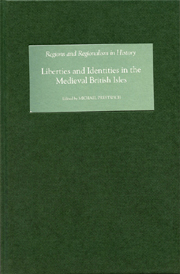Book contents
- Frontmatter
- Contents
- List of maps
- Abbreviations
- Introduction
- 1 States, liberties and communities in medieval Britain and Ireland (c.1100–1400)
- 2 Arbitration and Anglo-Scottish border law in the later middle ages
- 3 Peacekeepers and lawbreakers in medieval Northumberland, c.1200–c.1500
- 4 War, lordship, and community in the liberty of Norhamshire
- 5 The lordship of Richmond in the later middle ages
- 6 ‘Tam infra libertates quam extra’: Liberties and military recruitment
- 7 Neighbours from Hell? Living with Tynedale and Redesdale, 1489–1547
- 8 Striving for Marcher liberties: The Corbets of Caus in the thirteenth century
- 9 Franchises north of the border: Baronies and regalities in medieval Scotland
- 10 The liberties of Ireland in the reign of Edward I
- Index
3 - Peacekeepers and lawbreakers in medieval Northumberland, c.1200–c.1500
Published online by Cambridge University Press: 12 September 2012
- Frontmatter
- Contents
- List of maps
- Abbreviations
- Introduction
- 1 States, liberties and communities in medieval Britain and Ireland (c.1100–1400)
- 2 Arbitration and Anglo-Scottish border law in the later middle ages
- 3 Peacekeepers and lawbreakers in medieval Northumberland, c.1200–c.1500
- 4 War, lordship, and community in the liberty of Norhamshire
- 5 The lordship of Richmond in the later middle ages
- 6 ‘Tam infra libertates quam extra’: Liberties and military recruitment
- 7 Neighbours from Hell? Living with Tynedale and Redesdale, 1489–1547
- 8 Striving for Marcher liberties: The Corbets of Caus in the thirteenth century
- 9 Franchises north of the border: Baronies and regalities in medieval Scotland
- 10 The liberties of Ireland in the reign of Edward I
- Index
Summary
This paper seeks to revisit the time-honoured assumption of the exceptional, even devoted, lawlessness of medieval Northumberland. Formidable difficulties hinder the work of scrutiny. The sources are rarely home-grown, mostly deriving from judicial visitations. Until the last decade of the thirteenth century these were primarily eyres, lengthy sessions which came at intervals of several years and entailed a wholesale review of the processes of law enforcement; after the 1290s eyres were mainly succeeded by gaol deliveries, clearances of gaols through trials of their inmates, usually conducted every one or two years. All were directed from Westminster and are recorded in the language of a centralised legal system. There are also chronological problems, inevitable in a paper covering some three hundred years, during which problems and solutions, attitudes and expectations, did not always remain the same.
The basic argument of this paper is straightforward and can be simply expressed. It is not that there was no disorder or criminality in medieval North-umberland, but rather that throughout most of the county, for most if not all of the time, there was a general consensus that crime – which here means the offences that medieval lawyers defined as felonies and which entailed forfeiture of life and goods, primarily homicide and the theft of goods worth more than 12d. – represented an affront to social morality as well as a breach of the king's peace.
- Type
- Chapter
- Information
- Liberties and Identities in the Medieval British Isles , pp. 56 - 76Publisher: Boydell & BrewerPrint publication year: 2008



